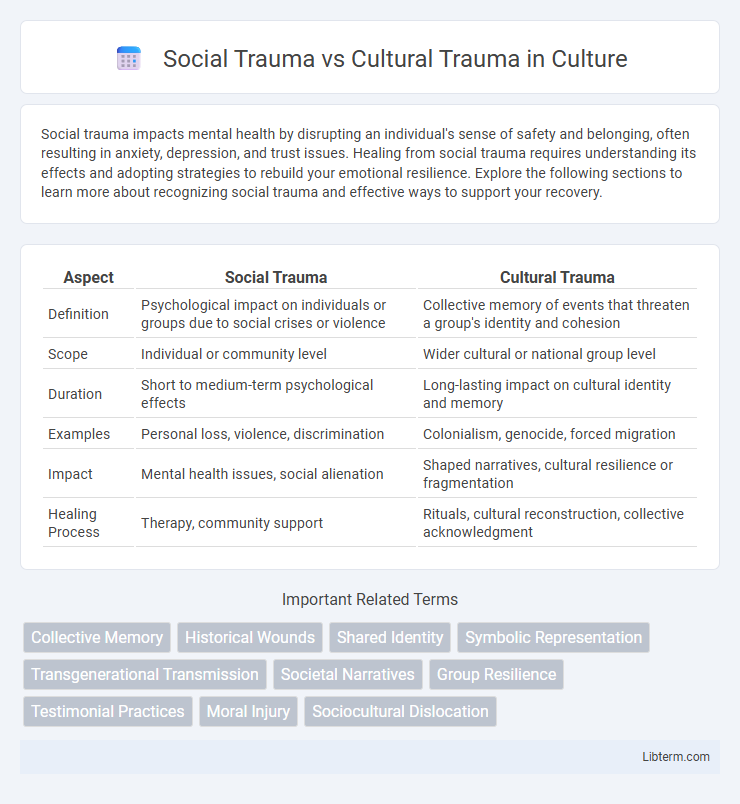Social trauma impacts mental health by disrupting an individual's sense of safety and belonging, often resulting in anxiety, depression, and trust issues. Healing from social trauma requires understanding its effects and adopting strategies to rebuild your emotional resilience. Explore the following sections to learn more about recognizing social trauma and effective ways to support your recovery.
Table of Comparison
| Aspect | Social Trauma | Cultural Trauma |
|---|---|---|
| Definition | Psychological impact on individuals or groups due to social crises or violence | Collective memory of events that threaten a group's identity and cohesion |
| Scope | Individual or community level | Wider cultural or national group level |
| Duration | Short to medium-term psychological effects | Long-lasting impact on cultural identity and memory |
| Examples | Personal loss, violence, discrimination | Colonialism, genocide, forced migration |
| Impact | Mental health issues, social alienation | Shaped narratives, cultural resilience or fragmentation |
| Healing Process | Therapy, community support | Rituals, cultural reconstruction, collective acknowledgment |
Defining Social Trauma
Social trauma refers to the psychological and emotional damage experienced by individuals or groups due to direct interpersonal violence, discrimination, or systemic oppression. It involves personal or collective experiences that disrupt social relationships and undermine trust within communities. Unlike cultural trauma, which encompasses broader societal identity shifts after large-scale events, social trauma centers on the immediate impact on social dynamics and personal well-being.
Understanding Cultural Trauma
Cultural trauma occurs when a collective group experiences a profound loss that reshapes its identity and memory, often triggered by events like colonization, genocide, or systemic oppression. Understanding cultural trauma involves recognizing how shared narratives and symbols influence group cohesion, collective memory, and intergenerational transmission of trauma. This collective experience differs from social trauma, which typically affects individuals or smaller social groups without redefining the broader group's cultural identity.
Key Differences Between Social and Cultural Trauma
Social trauma arises from direct personal experiences of violence, loss, or discrimination affecting individuals or groups, while cultural trauma refers to collective wounds embedded in societal narratives that alter identity and historical memory. Social trauma is often situational and immediate, linked to specific events, whereas cultural trauma evolves over time, shaping a group's ongoing perceptions and shared meanings. The key difference lies in social trauma's impact on personal or community well-being versus cultural trauma's deeper influence on collective consciousness and cultural identity transformation.
Historical Roots of Cultural Trauma
Cultural trauma arises from collective historical experiences that disrupt a group's identity and memory, often rooted in events such as colonization, genocide, or forced migration. This form of trauma embeds itself in cultural narratives and symbols, influencing subsequent generations through shared stories and rituals. Unlike social trauma, which affects individuals or communities in specific contexts, cultural trauma connects deeply to the historical roots that shape the collective consciousness of entire societies.
Causes and Examples of Social Trauma
Social trauma arises from direct interpersonal violence, systemic oppression, or community violence, impacting individuals' psychological well-being and social functioning. Causes include physical abuse, domestic violence, discrimination, and racial profiling, which generate acute stress and long-lasting emotional wounds. Examples of social trauma include survivors of gang violence, victims of police brutality, and individuals experiencing intimate partner violence.
Collective Memory and Identity Formation
Social trauma impacts collective memory by disrupting shared experiences within specific groups, often resulting in fragmented identity formation. Cultural trauma extends beyond immediate social groups, embedding itself in national or ethnic narratives that shape collective identity over generations. Both forms of trauma influence how communities remember past events and reconstruct their social identities through collective memory processes.
Psychological Impacts on Individuals and Groups
Social trauma arises from direct interpersonal violence or discrimination, causing acute psychological stress, anxiety, and trust issues among individuals and groups. Cultural trauma stems from collective experiences of historical oppression, displacement, or systemic injustice, leading to deep-seated identity crises, intergenerational grief, and a fractured sense of community. Both forms of trauma disrupt mental health but differ in scope and manifestation, with social trauma often triggering immediate emotional responses and cultural trauma embedding long-lasting psychological wounds across generations.
Societal Responses and Healing Mechanisms
Societal responses to social trauma often involve collective mourning, public acknowledgment, and community-driven support systems aimed at restoring social cohesion and trust. In cultural trauma, healing mechanisms emphasize preserving collective memory through rituals, storytelling, and cultural revitalization to rebuild identity and shared values. Both types of trauma rely on inclusive dialogue and reparative justice to foster resilience and societal reconstruction.
Media Influence on Perceptions of Trauma
Media influence plays a critical role in shaping perceptions of social trauma and cultural trauma by framing narratives that highlight collective suffering or individual experiences. Social trauma, often portrayed through news coverage of events like riots or natural disasters, becomes personalized and immediate, affecting public empathy and support. Cultural trauma narratives, amplified in documentaries and films, emphasize shared identity disruptions over time, reinforcing collective memory and group solidarity.
Long-Term Consequences for Communities
Social trauma often results from direct interpersonal violence or systemic oppression, leading to long-term effects such as mistrust, anxiety, and disrupted social networks within communities. Cultural trauma involves the collective suffering and identity loss stemming from historical events like colonization or genocide, causing enduring changes in cultural narratives, collective memory, and intergenerational trauma transmission. Both forms profoundly impact community cohesion, mental health, and social resilience, shaping the ways groups reconstruct their identities and healing processes over time.
Social Trauma Infographic

 libterm.com
libterm.com